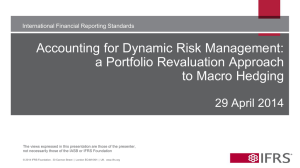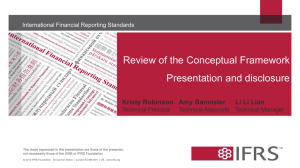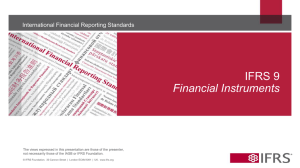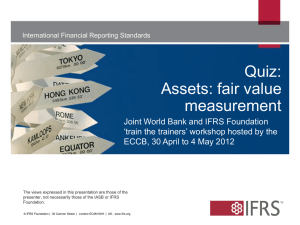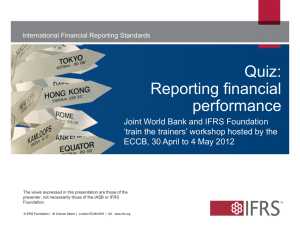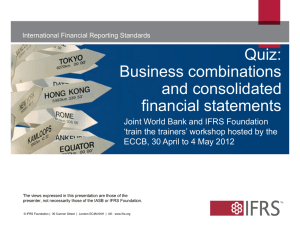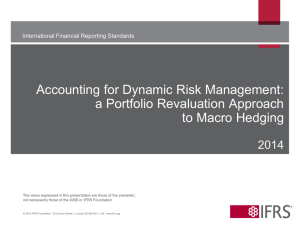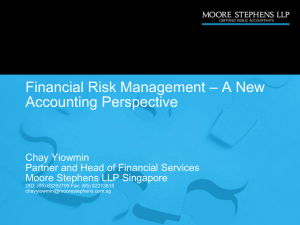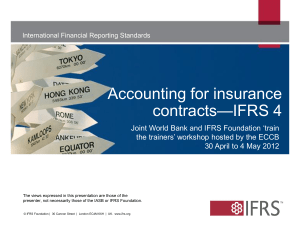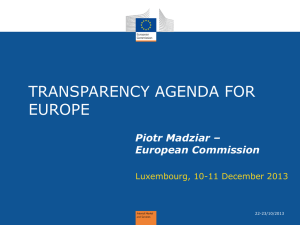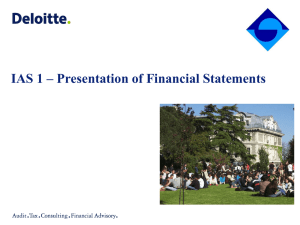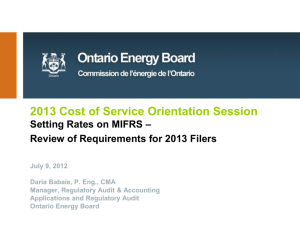Quiz: Financial instruments
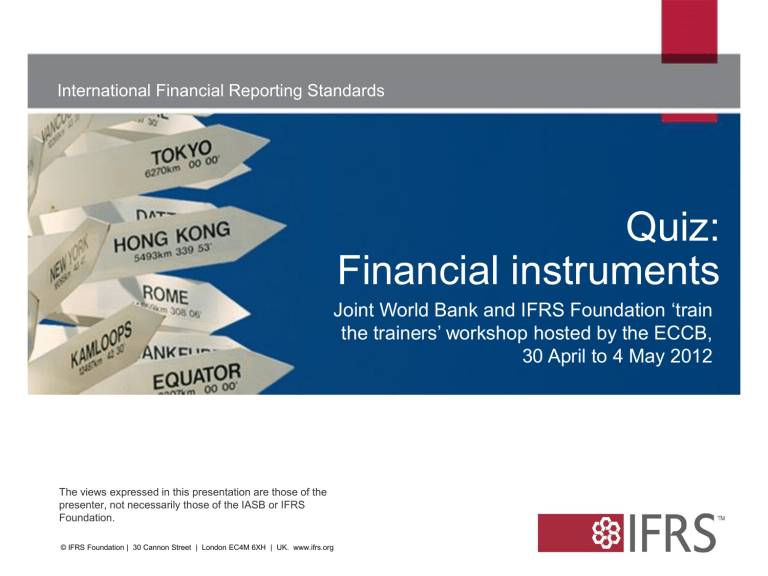
International Financial Reporting Standards
Quiz:
Financial instruments
Joint World Bank and IFRS Foundation ‘train the trainers’ workshop hosted by the ECCB,
30 April to 4 May 2012
The views expressed in this presentation are those of the
The views expressed in this presentation are those of the
Foundation.
not necessarily those of the IASB or IFRS Foundation.
© IFRS Foundation | 30 Cannon Street | London EC4M 6XH | UK. www.ifrs.org
Question 1
1/1/X1 Entity A buys 100 share options for 2,000 cash.
The options permit Entity A to buy shares in a listed entity
XYZ for 50 per share at any time during the next 2 years.
Bank charges a fee of 20. On 1/1/X1 XYZ's share price is
44.
At what amount should Entity A initially measure the options?
a.
1,900 b.
1,980 c.
2,000 d.
2,020 e.
4,040
© IFRS Foundation | 30 Cannon Street | London EC4M 6XH | UK. www.ifrs.org
Solution 1
At what amount should Entity A initially measure the options?
a.
1,900 b.
1,980 c.
2,000 Initially measure at FV which is usually the transaction price. 20 fee is expensed because will measure at FVTPL .
d.
2,020 e.
4,040
© IFRS Foundation | 30 Cannon Street | London EC4M 6XH | UK. www.ifrs.org
Question 2
Same facts as Question 1. At 31/12/X1 Entity A has not yet exercised the option; XYZ share price is 47; fair value of option is 2,500.
At what amount should Entity A measure the options at
31/12/X1?
a.
1,980 b.
2,000 c.
2,020 d.
2,500 e.
4,700
© IFRS Foundation | 30 Cannon Street | London EC4M 6XH | UK. www.ifrs.org
Solution 2
Same facts as Question 1. At 31/12/X1 Entity A has not yet exercised the option; XYZ share price is 47; fair value of option is 2,500.
At what amount should Entity A measure the options at
31/12/X1?
a.
1,980 b.
2,000 c.
2,020 d.
2,500 Subsequent measurement at fair value e.
4,700
© IFRS Foundation | 30 Cannon Street | London EC4M 6XH | UK. www.ifrs.org
Question 3
6
Entity borrows 10,000 from a bank 5 years, fixed interest payable annually 6% in arrears (this is a market rate.)
Bank charges entity 50 loan application fee. Entity should measure the loan on initial recognition at...
a.
7,473 (= PV 10,000 at 6% for 5 years) b.
7,423 c.
9,950 d.
10,000 e.
10,050
© IFRS Foundation | 30 Cannon Street | London EC4M 6XH | UK. www.ifrs.org
Solution 3
Entity should measure the loan on initial recognition at...
7 a.
7,473 (= PV 10,000 at 6% for 5 years) b.
7,423 c.
9,950. Loan will be carried at amortised cost. Fee is netted against loan. Affects effective interest.
See next slide...
d.
10,000 e.
10,050
© IFRS Foundation | 30 Cannon Street | London EC4M 6XH | UK. www.ifrs.org
Solution 3 continued
7
8
5
6
Excel
1
2
3
4
A
9950
-600
-600
Using Excel to calculate internal rate of return in Question 3
-600
-600
-10600
0.6 [“Guess” at IRR, can omit]
6.11908% [=IRR(A1:A6,A7)]
8
© IFRS Foundation | 30 Cannon Street | London EC4M 6XH | UK. www.ifrs.org
Solution 3 continued 9
Year
1
2
Loan liability beginning
9,950
Interest expense at
6.11908%
609
9,959 609
3
4
5
9,968
9,978
9,989
610
611
611
Cash paid
600
600
600
600
600
Loan liability ending
9,959
9,968
9,978
9,989
10,000
© IFRS Foundation | 30 Cannon Street | London EC4M 6XH | UK. www.ifrs.org
Question 4
10
Entity A sells 100 of receivables to bank for 85. Entity A continues to collect and remit amounts collected to bank, for which bank pays a fee to Entity A. Entity A has no obligation for credit losses or for slow payment by debtors. How is this transaction accounted for?
a.
Entity A removes receivables from its balance sheet and shows no liability for 85 proceeds b.
Entity A keeps 100 receivables on its balance sheet and shows a liability for 85 c.
Entity A keeps 100 receivables on its balance sheet and shows no liability for 85 d.
Entity A removes receivables from its balance sheet and shows a liability for 85
© IFRS Foundation | 30 Cannon Street | London EC4M 6XH | UK. www.ifrs.org
Solution 4
11
How is this transaction accounted for?
a.
Entity A removes receivables from its balance sheet and shows no liability for 85 proceeds b.
Entity A keeps 100 receivables on its balance sheet and shows a liability for 85 c.
Entity A keeps 100 receivables on its balance sheet and shows no liability for 85 d.
Entity A removes receivables from its balance sheet and shows liability 85
© IFRS Foundation | 30 Cannon Street | London EC4M 6XH | UK. www.ifrs.org
Question 5
A financial instrument that is designated as a hedging instrument is always measured at Fair Value Through Profit or Loss?
a.
True b.
False
© IFRS Foundation | 30 Cannon Street | London EC4M 6XH | UK. www.ifrs.org
Solution 5
A financial instrument that is designated as a hedging instrument is always measured at Fair Value Through Profit or Loss?
a.
True b.
False. If it is a hedge of interest in a recognised financial instrument, or hedge of firm commitment or forecast transaction, hedging instrument is measured at
FV through OCI, with subsequent recycling.
© IFRS Foundation | 30 Cannon Street | London EC4M 6XH | UK. www.ifrs.org
Question 6
Entity A has inventory it plans to sell in 3 months. Entity A is worried about price decline during the 3 months and so enters into forward contract to hedge price risk of its inventory. Relationship meets conditions for hedge accounting and Entity A documents the hedge.
What is the accounting?
© IFRS Foundation | 30 Cannon Street | London EC4M 6XH | UK. www.ifrs.org
Question 6 continued a.
Recognise forward contract as an asset or liability at FV and change in FV in P&L. Recognise the change in FV of the inventory in P&L and as an adjustment to the carrying amount of the inventory . b.
Recognise forward contract as an asset or liability at FV and change in FV in OCI. Recognise the change in FV of the inventory in OCI and as an adjustment to the carrying amount of the inventory. c.
Recognise forward contract as an asset or liability at FV and the change in the FV of the forward contract in OCI.
Do not recognise the change in the FV of the inventory as inventory is measured at cost.
© IFRS Foundation | 30 Cannon Street | London EC4M 6XH | UK. www.ifrs.org
Solution 6 continued a.
Recognise forward contract as an asset or liability at
FV and change in FV in P&L. Recognise the change in FV of the inventory in P&L and as an adjustment to the carrying amount of the inventory. b.
Recognise forward contract as an asset or liability at FV and change in FV in OCI. Recognise the change in FV of the inventory in OCI and as an adjustment to the carrying amount of the inventory. c.
Recognise forward contract as an asset or liability at FV and the change in the FV of the forward contract in OCI.
Do not recognise the change in the FV of the inventory as inventory is measured at cost.
© IFRS Foundation | 30 Cannon Street | London EC4M 6XH | UK. www.ifrs.org
Questions 7 and 8
Scenario
17
Entity A purchased a bond at face value (equal to the fair value at that date) that pays a coupon based on the market interest rate of 5 per cent per annum. At purchase date, there are 20 years until the bond’s maturity date.
Interest of CU500 is received every year in cash. The bond has a maturity value of CU10,000.
© IFRS Foundation | 30 Cannon Street | London EC4M 6XH | UK. www.ifrs.org
Question 7
• Assume that the bond is measured at amortised cost and that two years after the bond was purchased, the market interest rate changed to 6 per cent per annum.
• What journal entries should be processed by the entity relating to the bond from inception until maturity of the bond?
18
© IFRS Foundation | 30 Cannon Street | London EC4M 6XH | UK. www.ifrs.org
Solution 7
At purchase date:
Dr Asset —bond
Cr Asset —cash
Years 1 – 20:
Dr Asset —cash
Cr Income —interest
At maturity date:
Dr Asset —cash
Cr Asset —bond
© IFRS Foundation | 30 Cannon Street | London EC4M 6XH | UK. www.ifrs.org
10,000
10,000
500
500
10,000
10,000
19
Question 8
• Assume that instead of being purchased at face value, the bond was purchased at a discount of 20 per cent.
The bond is correctly measured at amortised cost.
• What journal entries should be processed by the entity relating to the bond at purchase date and for the first year thereafter?
20
© IFRS Foundation | 30 Cannon Street | London EC4M 6XH | UK. www.ifrs.org
Solution 8
At purchase date:
Dr Asset —bond
Cr Asset —cash
CU10,000 x 80% = CU8,0000
8,000
8,000
Year 1:
Dr Asset —cash
Cr Asset —bond
Dr Asset —bond
Cr Income —interest
500
550
500
550
Effective interest rate = 6.87% (PV=CU8,000; n=20; PMT =CU500 and FV=CU10,000), CU8,000 x 6.87% = CU550
21
© IFRS Foundation | 30 Cannon Street | London EC4M 6XH | UK. www.ifrs.org
Questions 9, 10 and 11
Scenario
22
• An entity enters into a forward exchange contract on 30
April 20X1 to receive USD100,000 and deliver
CU399,688 on 31 March 20X2. The forward exchange contract is designated as a hedging instrument for the purchase of inventory on
31 December 20X1 —the resulting payable is to be settled on 28 February 20X2
• All hedge accounting conditions are met
• The entity’s reporting period ends on 31 October
© IFRS Foundation | 30 Cannon Street | London EC4M 6XH | UK. www.ifrs.org
Questions 9, 10 and 11
Scenario continued
• The following spot and fair values of the forward exchange rate contract are applicable:
30 April 20X1
31 October 20X1
31 December 20X1
28 February 20X2
SPOT
3.7300
3.4714
3.3100
3.1507
FAIR VALUE OF
CONTRACT
0
(39,253)
(62,658)
(84,623)
23
© IFRS Foundation | 30 Cannon Street | London EC4M 6XH | UK. www.ifrs.org
Question 9
24
What journal entry(ies) must be processed at 31 October
20X1 assuming that the entity designates the forward exchange contract as a cash flow hedge of a forecast transaction and the option in IAS39.98(b) is selected?
© IFRS Foundation | 30 Cannon Street | London EC4M 6XH | UK. www.ifrs.org
Solution 9
31 October 20X1:
Dr OCI —cash flow hedge
Cr Liability —forward contract
39,253
39,253
25
© IFRS Foundation | 30 Cannon Street | London EC4M 6XH | UK. www.ifrs.org
Question 10
26
What journal entry(ies) must be processed at 31 October
20X1 assuming that the entity designates the forward exchange contract as a cash flow hedge of a forecast transaction and the option in IAS39.98(a) is selected?
© IFRS Foundation | 30 Cannon Street | London EC4M 6XH | UK. www.ifrs.org
Solution 10
31 October 20X1:
Dr OCI —cash flow hedge
Cr Liability —forward contract
39,253
39,253
27
Note: the difference in accounting between the two options in IAS39.98 relates to the timing of the effect on profit or loss (ie a basis adjustment to the hedged item or as the hedged item affects profit or loss)
© IFRS Foundation | 30 Cannon Street | London EC4M 6XH | UK. www.ifrs.org
Question 11
28
What journal entry(ies) must be processed at 31 October
20X1 assuming that the entity designates the forward exchange contract as a fair value hedge of an unrecognised firm commitment?
© IFRS Foundation | 30 Cannon Street | London EC4M 6XH | UK. www.ifrs.org
Solution 11
31 October 20X1:
Dr Profit or loss —exchange loss 39,253
Cr Liability —forward contract 39,253
Dr Asset —firm commitment
Cr Profit or loss —exchange gain
25,860
25,860
USD100,000 x (3.7300 – 3.4714) = CU25,860
29
© IFRS Foundation | 30 Cannon Street | London EC4M 6XH | UK. www.ifrs.org
Questions or comments?
Expressions of individual views by members of the IASB and its staff are encouraged.
The views expressed in this presentation are those of the presenter.
Official positions of the IASB on accounting matters are determined only after extensive due process and deliberation.
© IFRS Foundation | 30 Cannon Street | London EC4M 6XH | UK. www.ifrs.org
30
The requirements are set out in
International Financial
Reporting Standards (IFRSs)
, as issued by the IASB at
1 January 2012 with an effective date after 1 January
2012 but not the IFRSs they will replace.
The IFRS Foundation, the authors, the presenters and the publishers do not accept responsibility for loss caused to any person who acts or refrains from acting in reliance on the material in this PowerPoint presentation, whether such loss is caused by negligence or otherwise.
© IFRS Foundation | 30 Cannon Street | London EC4M 6XH | UK. www.ifrs.org
